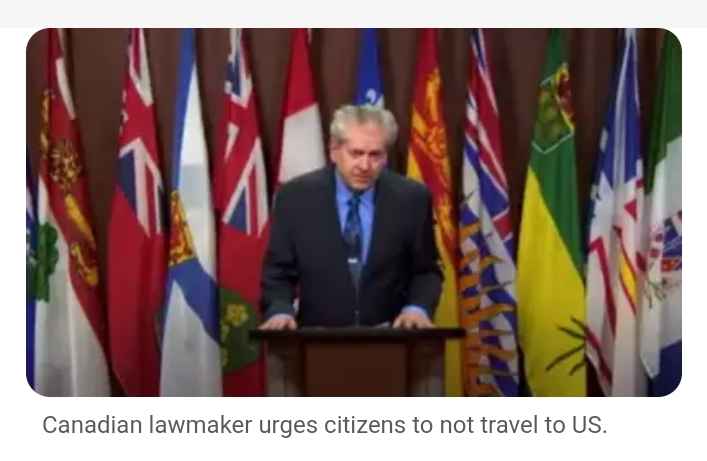CELEBRITY
Breaking News:Canadian lawmaker warns people against traveling to USA “They are kidnapping our residents with” … See more

Breaking News:Canadian lawmaker warns people against traveling to USA “They are kidnapping our residents with” … See more.
Canadian Lawmaker Issues Stark Warning Against Travel to the United States: “They Are Kidnapping Our Residents”
In a striking escalation of cross-border tensions, a Canadian lawmaker has issued a dire warning to citizens, urging them to avoid traveling to the United States. The provocative statement, “They are kidnapping our residents,” has ignited debates about safety, sovereignty, and the deteriorating relationship between the two North American neighbors. This claim, reported widely including by The Times of India, reflects growing concerns among some Canadian officials and citizens over alleged incidents involving Canadian nationals on U.S. soil. Below, we explore the context, implications, and reactions to this alarming assertion as of March 23, 2025.
The Lawmaker’s Warning
The warning stems from a Canadian parliamentarian whose identity has been tied to the statement in various reports, though specifics remain fluid in early coverage. The lawmaker’s central accusation is that the United States is engaging in actions tantamount to “kidnapping” Canadian residents, either through aggressive law enforcement tactics, wrongful detentions, or other unexplained disappearances. While no official government statement from Canada has yet corroborated this rhetoric, the lawmaker’s comments have tapped into a vein of unease about traveling south of the border.
This is not the first time Canadian officials have expressed apprehension about U.S. policies impacting their citizens. Historical tensions over extradition cases, border security, and differing legal frameworks have periodically strained relations. However, the use of the term “kidnapping” marks a significant rhetorical escalation, suggesting either a specific incident or a broader pattern that has yet to be fully substantiated in public discourse.
Border Incidents: Overzealous U.S. border agents detaining Canadians for minor infractions—or without clear justification—might contribute to this narrative.
Criminal Activity Misinterpreted: Canadians caught in U.S. legal troubles (e.g., drug trafficking or immigration violations) could be portrayed as victims of a predatory system rather than perpetrators.
Without specifics, however, the claim remains speculative. Official data on Canadian detentions in the U.S. or unresolved disappearances would be critical to validating the lawmaker’s stance, but no such evidence has been widely circulated as of March 23, 2025.
Implications for Travelers
For now, the practical impact on Canadian travelers is unclear. Canada has not issued an official travel advisory against the U.S., which would elevate this from a lawmaker’s opinion to a governmental stance. Travelers are left to weigh the warning against their own risk tolerance. The U.S. remains a top destination for Canadians for tourism, business, and family ties, making a blanket avoidance challenging.
Still, the rhetoric could sow doubt. Canadians planning U.S. trips might scrutinize their documentation more closely, avoid contentious areas, or brace for potential profiling. Conversely, some may dismiss the warning as alarmist, especially absent a clear incident to anchor it.
Broader Canada-U.S. Relations
This episode underscores the fragility of Canada-U.S. ties in an era of shifting geopolitics. The two nations share the world’s longest undefended border and a deeply intertwined economy, yet trust can erode quickly when inflammatory language enters the fray. If the “kidnapping” narrative gains legs—whether through evidence or repetition—it could prompt calls for retaliatory measures, such as stricter Canadian border policies or diplomatic protests.
Historically, both countries have navigated disputes with pragmatism, but populist currents on either side could complicate resolution. The U.S. might counter that Canada’s own legal system has overstepped in past cases involving American citizens, flipping the scription sovereignty concerns.
What’s Next?
The lawmaker’s warning hangs in a state of limbo until more details emerge. Key questions remain: Is this tied to a specific event, like a recent detention? Does it reflect a broader policy critique? Or is it a one-off outburst unlikely to alter bilateral dynamics? Answers may come from official statements, investigative reporting, or further elaboration by the lawmaker themselves.
For now, Canadians and Americans alike are left to ponder the weight of “kidnapping” in a relationship long defined by cooperation. As of March 23, 2025, the story is unfolding—one that could either fade into obscurity or mark a turning point in how these neighbors view each other.













